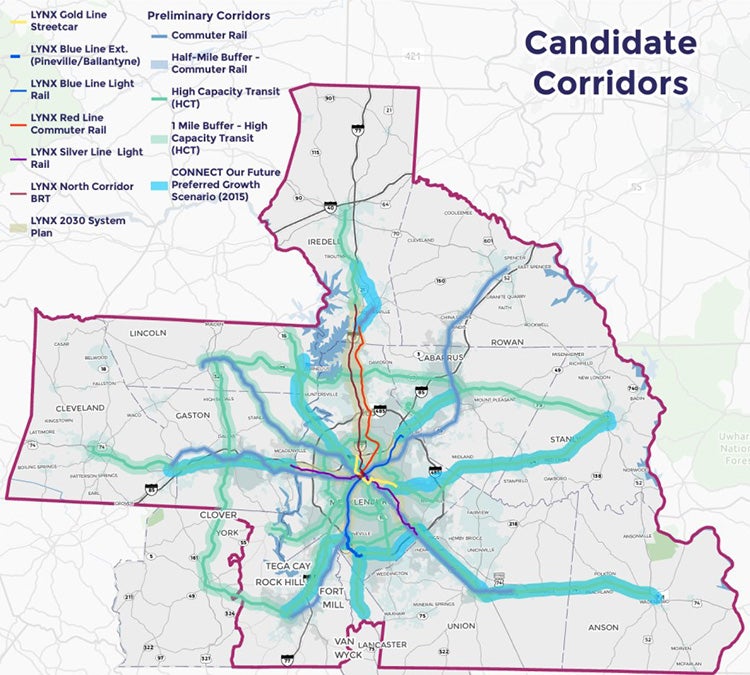CONNECT Beyond Regional Mobility Plan

CONNECT Beyond Regional Mobility Plan
A New Regional Transit Vision in the Carolinas, Informed by Equity and Stakeholder Outreach
CONNECT Beyond is a first-of-its-kind regional mobility initiative led by the Centralina Regional Council and the Charlotte Area Transit System. It creates a long-term, modern, high-quality transit network for the two-state, 12-county region. CONNECT Beyond developed a cohesive vision and plan for future public transit and multimodal services in the region, it will serve as a blueprint for how to implement a robust, interconnected network combining high-capacity transit lines, enhanced bus service and other innovative mobility solutions. Crafted alongside 17 transit agencies, who account for 24.4 million transit trips and more than $200 million in operating costs in 2018, the CONNECT Beyond plan produces an integrated system that provides access to jobs, education, and medical facilities and services. It serves as the foundation to keep the region economically competitive and sustain and enhance its great quality of life.
HDR served as the prime consultant leading the effort to provide a single transit vision for the two-state area. This included helping to identify high-capacity transit corridors, developing the steps to regionally coordinate and implement new mobility technologies and creating an action-oriented implementation approach for over 100 recommendations.
The Region’s First Transit Vision and Implementation Plan
The project provides a single transit vision, identifies high-capacity transit corridors, coordinates regionally to cross boundaries and implement technologies, and creates an action-oriented implementation approach. The plan unveiled a map that specifies high-capacity corridors, envisioning an elaborate system of high-speed mass transit that could link light rail, commuter rail, dedicated bus lanes and commuter express buses from Charlotte to the region’s cities, towns and unincorporated areas.
Integrating and Coordinating Diverse Transit Systems
The region’s geographic diversity makes the plan unique. Made up of rural towns, suburban communities and an urban hub — Charlotte — each geography type has different challenges and needs. The project team, through two previous studies, gained a fundamental understanding of those challenges with extensive stakeholder outreach and community engagement.
A key driver for the project and fundamental recommendation was to enhance the transit user experience by furthering an integrated, app-based system that riders can use across all transit agencies and modes. This will help the user navigate the 17 different transit systems in the region, only six of which offer fixed-route service and with all operating independently with their own hours, fees, fares, routes and frequencies. The project aimed at making the user experience across the various transit systems seamless through a series of recommendations that would assist in the development of an integrated fare payment system, coordinated scheduling software, and the creation of mobility hubs where transit agencies interact.
Data-Informed Equity Analysis
As part of the project, the team used data gathered to build a transit propensity index that identifies specific demographic factors that indicate likeliness to use public transit, including minority identity, low-income status, disability, age and more.
This equity analysis helped identify potential high-capacity transit corridors and confirmed that current planning matches the areas of greatest need. The index showed how transit lines connect affordable housing locations to essential services such as hospitals or employment centers. This allowed the team to focus on how transit can be a solution to upward mobility and housing challenges.
Public Involvement
As the project kicked off, the COVID-19 pandemic began and the team had to quickly pivot and change course on how they would engage the community. The team turned to multiple advisory committees (technical, community and policy) to provide a holistic community-based lens for the vision and context within each community, region and statewide system. These committees also supported project efforts to educate, involve and empower civic leaders and community members about the importance of a regional transit system, the transit vision and how to implement the plan. Targeted listening sessions with community members were held to solicit feedback on the plan’s draft recommendations.




